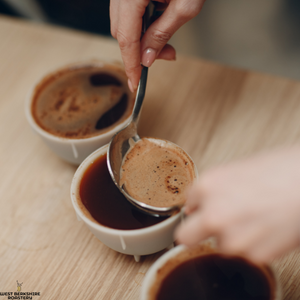What's the best water for brewing coffee?
Although our quest for superior coffee beans is relentless, we mustn't overlook that water comprises roughly 98% of every coffee cup. The water's quality can significantly affect your coffee's ultimate taste. You may be pondering the optimal water type for coffee making.
SCA Recommendations
The Specialty Coffee Association (SCA) suggests the following water specifications:
Total Dissolved Solids (TDS): 150-175 ppm
Calcium Hardness: 50-175 ppm CaCO3
Alkalinity: 40-75 ppm CaCO3
pH Level: 6.5-7.5
These technical details might seem baffling unless you revel in the science behind them. Let's delve into how the water components influence your coffee's flavor.
TDS encapsulates the sum of minerals like calcium, magnesium, and sodium present in the water. The SCA endorses a TDS amount of 150-175 ppm, conducive to extracting the beans' flavors fully.
Calcium Hardness indicates the concentration of calcium and magnesium. A range of 50-175 ppm CaCO3 is advised for flower notes and a balanced taste profile.
Alkalinity measures the water's capacity to neutralize acids. With recommended levels between 40-75 ppm CaCO3, it helps moderate the coffee's acidity for a smoother taste.
pH Level assesses whether water is acidic or basic. An ideal SCA-recommended neutral pH of 6.5-7.5 ensures the water does not alter the coffee's inherent flavor.
To discover your home's water type, employ a water testing kit or inquire with your local water utility regarding your tap water's mineral content and pH level. Online resources may also list water hardness information for your locality.
Understanding this data, let's see which elements are key to your brewing:
Calcium is valuable for extracting the nuanced flavors from the coffee grounds.
Magnesium bonds with certain flavour-enhancing compounds.
Bicarbonate keeps acidity and other characteristics in check, preserving the coffee's original acidity profile.
Water Types for Coffee Brewing
Filtered Water
Using filtered water is practical and eco-friendlier than bottled water. Integrated tap filters are great, but for many, affordable filter jugs - like Brita which requires bimonthly cartridge changes - are good options. Sustainable, refillable cartridges are also available.
Mineral Water
A little mineral content can enrich the coffee's taste, but excessive levels lead to hardness that could dampen flavour. Opting for supermarket brands may be a cost-effective choice with fewer minerals, better suited for brewing.
Tap Water
Tap water's composition significantly influences taste. Magnesium can enhance sharp, fruity notes, while calcium tends to bolster heavier, creamy flavors. Be cautious of iron and copper from aging pipes, which may introduce a metallic taste. Variations in tap water hardness by location mean some may have suitable water for coffee directly from the tap. Nonetheless, if the water tastes off or has an unusual odor, filtration is advisable to prevent negative impacts on your coffee flavour.
Distilled Water
Despite seeming ideal due to its purity, distilled water is a no-go. Its lack of minerals can lead to over-extraction, yielding a weak and overly bitter coffee.
Softened Water
Stay away from using softened water; its high sodium content could leave your coffee tasting soapy.
Maintenance and Final Thoughts
Remember, if you're using a coffee machine, descaling, particularly in hard water areas, is crucial not just for flavor but to maintain proper machine function.
Takeaways:
The bottom line is, if the water doesn't taste right alone, it won't do your coffee any favors.
Prefer filtered water, ensuring it retains some minerals.
Investigate your local water specifications – switching up your water can elevate your home coffee to rival your favorite café.
Bringing attention to your water choice could be the missing piece in achieving that coffee shop quality brew in your own home.


